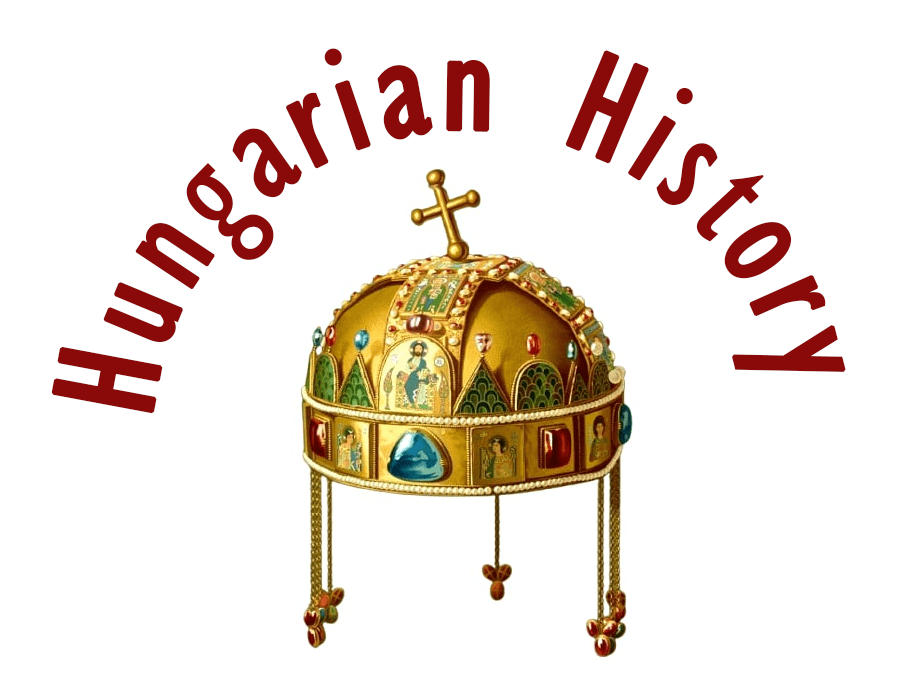Prince Bethlen Gábor of Transylvania
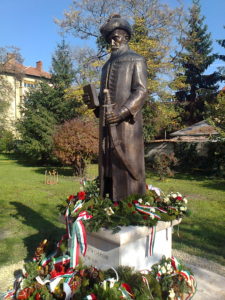
Bethlen Gábor (Gabriel) (1580 – 1629) was a Protestant uncrowned King of Hungary (1620-21), Prince of Transylvania (1613-29), and Duke of Opole (1622-25) who led an anti-Habsburg rebellion in the Kingdom Hungary. It was he who turned Transylvania into the famous “Fairy Garden” as it was then known.
We know that Bethlen’s grandfather led 600 lancers at the battle of Mohács in 1526 and later sided with King Szapolyai János against the Habsburg Ferdinand. Bethlen Gábor was born in 1580 in Marosillye, Transylvania, you can read more about the history of Marosillye here:
https://www.hungarianottomanwars.com/transylvania/marosillye/

Later, Bethlen served at the court of Báthori Zsigmond (Sigismund), a Transylvanian prince, and accompanied him on his campaign to Wallachia. As mentioned in a previous article, in 1605 Bethlen supported Prince Bocskai István and his successor Báthori Gábor (1608-1613). Bethlen later fell out with Báthori because he wanted to side with the Habsburgs.
The Transylvanian Estates were not happy with Prince Báthori Gábor’s rule, and even the Catholics were against him, as were the German Saxons and his advisors. Bethlen fled to the Ottoman Empire, where he made excellent connections. He soon returned with Ottoman soldiers and had himself elected Prince of Transylvania in Kolozsvár on October 23, 1613.

The Estates were somewhat intimidated by the 80,000 Ottoman, Moldavian (Romanian), and Crimean Tatar troops that accompanied Bethlen to Transylvania. Their commander was Pasha Szkender, who summoned the Diet to Kolozsvár to oversee Bethlen’s election. Since the previous prince, Báthory Gábor, had been assassinated by the Hajdú soldiers a few days before the election, Bethlen had no opponents.
For this reason, the Westerners tended to see Bethlen as the Sultan’s pet, but this was far from the truth. It was just a political ploy to gain power, and after that, he ran the internal affairs of Transylvania as he saw fit. He also took part in the 30-year war against the Habsburgs.

As the previous 25 years had been rather bloody and unsafe in Transylvania, the peace that Bethlen brought soon became known as the “Golden Age” of Transylvania. Bethlen’s rule was one of patriarchal enlightened absolutism, where he was not afraid to use force to achieve his goals. He developed mines and industry and took over much of Transylvania’s foreign trade. His agents bought goods at fixed prices and sold them abroad at a profit.
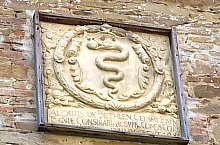
Bethlen maintained an efficient standing army of mercenaries. While maintaining relations with the Sublime Porte, the Ottomans, he sought to gain land to the north and west. During the Thirty Years’ War, he attacked the Habsburgs of the Hungarian Kingdom (1619-1626). Bethlen opposed the tyranny of the Habsburgs and the persecution of Protestants in the Kingdom of Hungary, as well as the violation of Bocskai’s Peace of Vienna in 1606.

You can read an excellent study about Bethlen’s army here:
http://katonak-bethlen-gabor-korabol.hu/download/Soldiers_from_the_Age_of_Gabor_Bethlen.pdf
In August 1619, Bethlen invaded the Kingdom of Hungary for the first time, in alliance with the Bohemian nobility who had rebelled against the Habsburgs. The counties of Upper Hungary quickly sided with him, hoping that he would protect their religious and civil rights.
In September, he took Kassa (Kaschau, Kosice), where his Protestant supporters proclaimed him the leader of Hungary and protector of the Protestants. This incredibly quick success gave him control over Upper Hungary. It was during this month that three Jesuits were mercilessly executed in Kassa, under his authority but without his knowledge. These victims, one of whom was a good friend of Pázmány Péter, were later known as the Martyrs of Kassa and were canonized by the Catholic Church.

In October 1619, Bethlen took Pozsony (Bratislava, Pressburg), where Forgách Zsigmond, the Palatine of Hungary granted him the Holy Crown of Hungary. This gave him a serious opportunity. He could easily take over the Kingdom of Hungary, as the local landlords and Borderland warriors immediately sided with him.
Skeptics might say that the nobility swore allegiance to him because no one liked armies marching through their lands. After all, Bethlen was the only one who could guarantee the territorial status quo and the uninterrupted continuity of the nobility’s feudal rights. Moreover, Bethlen’s rapid success was somewhat reminiscent of the glorious age of King Matthias Corvinus.
On the other hand, the petty nobility loved him more because Bethlen had the money to pay both the Borderland warriors and the Hajdu soldiers fairly. He encouraged them to join him, and they flocked to his banner: a foot soldier received 3 forints a month, and a horseman 4. It was very little, but at least it was paid regularly.
In November, his army captured the outskirts of Vienna. Unfortunately, Bethlen did not take Vienna and soon the forces of Drugeth György, captain of Upper Hungary, and Polish mercenaries forced Bethlen to leave Austria and Upper Hungary.

Bethlen negotiated peace at Pozsony and Kassa in 1620 and was eventually granted ownership of 13 counties in the eastern part of the Kingdom of Hungary. In 1619 everything was ready for him to be crowned, but in the summer of 1620, Bethlen refused the Holy Crown, just as Bocskai had done in 1605.
Meanwhile, the Estates of Hungary met in Pozsony, and although the counties of Győr, Moson, and Veszprém did not send their envoys, the Diet declared on January 8, 1620, that Bethlen Gábor would be elected Prince of Hungary. They followed the example of the Bohemian nobility, who also elected a new king, Frederick von Pfalz to oppose Ferdinand II of Habsburg.
The kingdom was also offered to Bethlen at this time, but he did not accept it, because the conditions of the election were so strict – the king approved the laws without change, he could not convene a parliament, and the bodies elected by the nobility, not the monarch, were competent in foreign and domestic affairs – that Bethlen could not sign them without diminishing his authority.

The prince, who already ruled Transylvania autocratically, could not have agreed to such a curtailment of his sovereign rights. However, he used the title “Prince of Hungary and Transylvania” and signed the laws of the Diet with it. The articles also stipulated that the Estates “shall live and die with him”.
The election of the king was scheduled for January 12, but the prince, who wanted to negotiate with the Habsburgs, could not accept the title of king, as he was told that if he did not accept the crown, he would gain more.
25 August 1620 Bethlen was elected as King of Hungary
The Transylvanian prince was expecting a major Ottoman reinforcement and had to settle the relations between Hungary and the Habsburgs. On 20 June 1620, Bethlen summoned the Estates to a diet in Besztercebánya (Banská Bystrica). First of all, they decided to continue the war against the Habsburgs. The Ottoman envoys arrived on 22 June with the Sultan’s permission to allow the Estates to elect a king. Thurzó Imre then initiated the dethronement of the Habsburgs: it was the first declaration of this kind in Hungarian history. At the same time, they elected Bethlen Gábor as king of Hungary, shouting “God save King Gábor”.
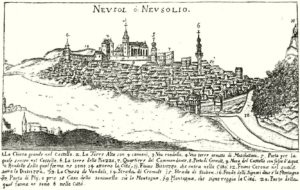
Bethlen’s refusal to accept the coronation wasn’t out of prudence, but because he didn’t want to go too far with the Habsburg Emperor Ferdinand II (who also claimed himself to be King of Hungary). If Bethlen had taken the title and the Holy Crown, any further negotiations would have been impossible. Furthermore, the Hungarian nobility, despite their support, did not want to contribute to the cost of the war, and the expected financial aid from Bohemia never arrived.
The Ottomans could not allow the two Hungarian territories to unite and become stronger
One of the most important reasons why Bethlen never accepted the crown was the opinion of the Sublime Porte. The Ottomans declared: “If God permits, let Bethlen Gábor be crowned king of Hungary, but we will never allow Transylvania to join his kingdom. This is because Transylvania was founded by Sultan Suleiman and is the property of the great emperor.
Therefore, we would not be able to trust the future Hungarian Kingdom of Bethlen as much as we trust Transylvania, and we cannot give it, our property, to anyone else”. The Sultan did not approve of the unification of Hungary and Transylvania. They said that Bethlen could be king of Hungary, but in that case, Transylvania should be annexed to the Ottoman Empire. Moreover, the Ottomans would have accepted Bethlen’s kingdom only if he swore fealty to the Sultan as his liege lord.
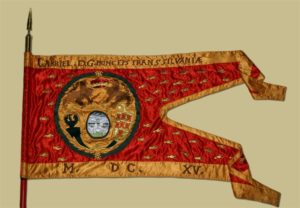
As we have seen, in his 1620 campaign Bethlen was able to successfully rally the Hungarians to his banner: he entered the Kingdom of Hungary with only 3,000 Transylvanian soldiers, and when he arrived in the Trans-Danubian region, all the warriors from the Border Fortresses of Tata, Pápa, Veszprém, Várpalota, Sümeg (and we have mentioned only the largest of the 14 fortresses that changed sides) willingly joined forces with him in a very short time. They argued as follows:
“We didn’t make this change in the hope of booty or for the sake of grabbing someone else’s property, but out of true love for our homeland and our unity in defending the freedoms of our country and preserving and restoring justice, and above all out of the desire for the right to live freely according to our faith and religion, which drove us in our actions”.
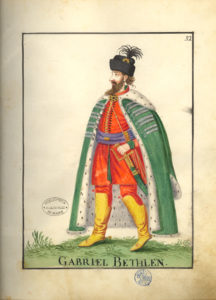
Bethlen valued them because they were the best warriors, experienced and hardened by many generations of wars with the Turks. The Austrian general Buquoi and Eszterházy Miklós (Nicholas) tried to force them back into the service of the emperor in 1621, but in vain: the warriors followed Bethlen’s call and gathered near Szombathely (Savaria) in January to oppose General Collato’s army. It is interesting to note that these warriors fought not only against Bethlen’s enemies but also against Bethlen’s “friendly” Turkish auxiliaries, who were unfortunately plundering the Hungarian countryside.
As for Bethlen’s courage, the story goes that when he was giving instructions for a siege, he was standing among his officers and the cannonballs fell very close to him. He was urged to step back. Bethlen calmly replied: “Where have you heard or read, my lords, that a prince has ever been hit by a cannonball?” and stayed where he was.
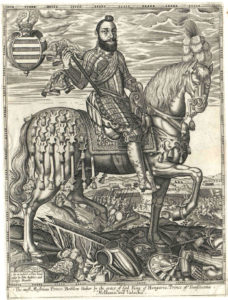
As for his coronation, Bethlen realized the risk and reflected on it as follows: “If I had been crowned, there could not have been a more mad and wretched ruler than me. The Turks would have wanted me to give them the Borderland castles of the country at once unless I wanted them to attack me like the Germans”. 
The Battle of White Mountain 1620
As it turned out, Emperor Ferdinand II was improving his military position against the Bohemians, who at this time were supported only by Bethlen. Finally, after defeating the Bohemians at the Battle of the White Mountains (Fehérhegy) on 8 November 1620, King Ferdinand II recaptured Pozsony (Bratislava, Pressburg) and the central mining towns of Hungary in 1621.
Now it was Bethlen who asked for peace and in December 1621 the Peace of Nikolsburg was signed. Bethlen renounced his royal title on the condition that Hungarian Protestants were granted religious freedoms in return for the title of Imperial Prince of Hungary and Transylvania, seven counties around the Upper Tisza River, and the important fortresses of Tokaj, Munkács (Munkacsevo) and Ecsed (Nagyecsed), and a duchy in Silesia.
The Peace of Nikolsburg was the result of Bethlen’s realization that he alone didn’t have enough power to reunite Hungary against the Habsburgs and that trying to do so without getting rid of the Ottoman yoke would lead to great danger. Bethlen also ceded the Holy Crown of Hungary to the Habsburgs.
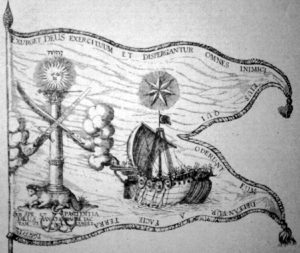
In 1623 – 1624 and 1626 Bethlen, allied with the anti-Habsburg Protestants, led campaigns against Ferdinand in Upper Hungary. The first campaign ended with the Peace of Vienna in 1624 and the second with the Peace of Pozsony in 1626. After the second campaign, Bethlen offered the Viennese court an alliance against the Ottomans and his hand in marriage to Renata Cecilia, Archduchess of Austria, but Ferdinand refused.
Instead, on his return from Vienna, Bethlen married the young and beautiful Catherine of Brandenburg, daughter of John Sigismund, Elector of Brandenburg. His brother-in-law was Gustavus Adolphus of Sweden, so they became in-laws. Catherine’s sister was the wife of Christian IV of Denmark, who had just attacked Ferdinand. You can read more about her here:
https://www.hungarianottomanwars.com/essays/catherine-of-brandenburg-wife-of-prince-bethlen/

The Court of Bethlen
In his capital, Gyulafehérvár (Alba Iulia), Bethlen built a magnificent new palace. Bethlen was a patron of the arts and the Calvinist church, and he granted hereditary nobility to Protestant priests. Although he was a Calvinist, he helped Káldy György, a Jesuit, to translate and print the Bible. He also composed hymns.
He also promoted learning by founding a college, encouraging the enrolment of Hungarian scholars and teachers, and sending Transylvanian students to the Protestant universities of England and the Netherlands, as well as to the Protestant principalities of Germany. He also ensured the right to education for the children of serfs.

Bethlen employed Johannes Thesselius from Erfurt as his kapellmeister (composer) in 1625. The prince loved music and, in addition to the eight German musicians he had previously employed, he had six harpists and violinists and invited more from Silesia – but he also had Italian and Polish musicians and eleven Turkish players.
There were also 12 trumpeters, and when his second wife, Catherine of Brandenburg, arrived, she brought with her the organist Michael Hermann, who later became a magistrate in Brassó (Brasov, Kronstadt). In 1629, Bethlen also invited organ builders from Germany. The last group of ten musicians arrived in January 1628, led by the dancing master Diego del Estrada.

Here we have to mention a nasty witch case that appeared in Bethlen’s court: Lady Báthory Anna was repeatedly accused of terrible crimes, but it was just an excuse for Bethlen to get her huge estates. When she finally handed over her lands and treasures to Bethlen and his wife, she was mercifully pardoned and expelled from Transylvania. This case may be a dark stain on the iconic statue of Bethlen Gábor, but who says that he was never a divisive figure among Hungarians?
Much more could be said about Bethlen Gábor, but perhaps this much was enough to arouse interest.

Prince Gábor Bethlen and the Jewish community of Transylvania
The reign of Prince Bethlen (1613-1629) was a milestone, not only because he invited more Jews from abroad to the principality, but also because he declared their privileges in 1623. Some historians believe that his patent had something to do with the gold mining rights of the town of Nagybánya (Baia Mare, Frauenbach), which were in Jewish hands and were returned to the prince shortly before 1623. The famous patent may have been issued as part of a secret agreement in exchange for these rights.
However, his patent was exceptional in Christian Europe. The Jewish people were given the right to worship, trade, and settle anywhere in Transylvania without restriction, without having to wear a distinctive sign, and could enjoy legal independence.
Most importantly, Bethlen broke with contemporary thinking and declared that the Jewish community could not be held collectively responsible for the crimes of its members.

Bethlen’s Patent is worth reading:
“Hereby, We (Bethlen) declare to grant the below-mentioned privileges to all members of the Jewish nation:
- They (the Jews) will be given assigned places to live and trade, protected by the commissioners of the locals and Ours.
- They are permitted to trade freely and import various goods from Constantinople. They are allowed to move from city to city and to leave Our country as they wish.
- A learned nobleman should be appointed as a go-between and attorney, not only to defend their rights but also to advance their interests in case there would be some conflicts arise. This commissioner should carefully pay attention that they should act neither in secret nor in public against Our Person, against the State nor Our Power.
- To live their life without more burdens, they should pay as much tax as before, whichever countries they may have come from. They should enjoy the same inviolability as the Anabaptists but they must not cheat any inhabitants of the country and they should not violate the public law.
- They are free to practice their religion according to their ritual habits without bothering others.
- If any Jews wanted to take refuge in Our country fleeing from Spain or other Christian countries and would like to take part in the practice of free religion, We promise to permit it so and grant them the same privileges.
- To evade any harm coming to them, they are allowed to wear Christian clothes without having to wear any humiliating marks.
- They have the right to take money out of the country but only by keeping the country’s interests in their mind.
- If the fate of Our country turned somehow to the worse (from which God may save us) and they were forced to flee the country, they should have the right to sell their properties within a year or transport them to a safer place.
- If any of them committed a crime, the individual criminal should be persecuted according to the law but the community should not be interrogated nor harassed.”

The death of Bethlen
Bethlen Gábor died on 15 November 1629, before he had finished his work with the Swedish alliance and before he had laid his hand on the Polish throne. He left behind a stable and independent country, a veritable ” Fairy Garden ” – it remained the task of Prince Rákóczi György to make it even stronger. When General Wallenstein heard of his opponent’s death, he cursed and exclaimed loudly that “it was about time that he finally croaked”.

Dear Readers, I can only make this content available through small donations or by selling my books or T-shirts.
If you like my writings, please feel free to support me with a coffee here:
You can check out my books on Amazon or Draft2Digital, they are available in hardcover, paperback, or ebook:
https://www.amazon.com/dp/198020490X
or at https://books2read.com/b/boYd81


My work can also be followed and supported on Patreon:


